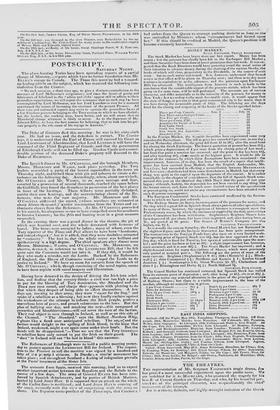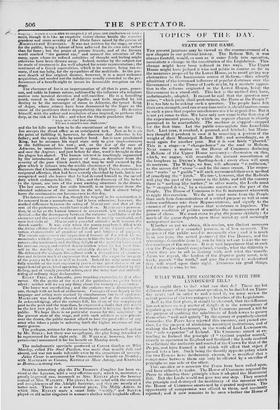THE THEATRES.
THE representation of Mr. Sergeant Taaeouao's tragic drama, /oat has proved a most successful experiment upon the public taste. We are indebted for it to .MACREADY, w110 produced the tragedy for his ben. fi: at Covent Garden on Thursday, and who, by his beautiful per- son: t o r of the principal character, was unquestionably the chief' insrru II lent of the triumph.
Iun is a chaste, delicate, and highly-wrought imitation of the Greek - , e,ascra a cii.ts.ates in simple ey of pew and exaltation uf seta.. !nest, though it is like an exquisite votive shrine beside the innesive grandeur and stern severity of the Doric flows raised by the peones of &senates and EURIPIDES. It was not written fur the stage, or even
for the public, being a labour of love achieved for its own sake rather than for fame ; but the praise of private friends, and of the literary world reached " the general ear," and aroused the attention of the many, upon whom its refined subtilties of thought and feeling might otherwise have been throve!' away. Indeed, neither by the subject nor its mode of treatment is Ion well adapted for scenic representation ; the sentiment of a Greek superstition, which is its essence, being too re- mote, if not too lofty, for the sympathies of the multitude. In the pre- sent dearth of fine original dramas, however, it is a most welcome acquisition, and needed not the indulgence usually conceded to the per- formances of a benefit-night to insure its fuvoursble reception on the stage. The character of Ion is an impersonation of all that is pure, gener- ous, and noble in human nature, sublimed by the influence of a religious motive into heroical devotion and self-sacrifice. Ile is a foundling youth, reared in the temple of Apollo ; and feels impelled by his destiny to be the messenger of (loom to Adrastus, the tyrant King of Argos, whose crimes have been denounced by the Sages as the cause of the pestilence that is depopulating the country. He devotes himself, with the ardour tied resolution ofone inspired, to perform this duty, at the risk of his life : and when the Oracle proclaims that " Argo: neer shall find release
Till her n onnrch's race shall cease,"
and the lot falls upon him to be the executioner of fate on the. King, Ion accepts the dread office as an anticipated task. Just as he is on the point of fulfilling it, however, he discovers that Adrastus is his father ; and the tyrant falls by another hand. Ion is now proclaimed King, but he assumes his royal state only to give impressiveness
to the fulfilment of his vow; and, as the last ty* the race of
Adrastus, he immolates himself to appease the wrath of the gods and save the Argives : and just before he dies, word is brought in that the plague has abated. The human interest is touchingly augmented
by the introduction of the passion of love,—a departure from the severity of the pure Greek model, that may be well excused by the
glow which it infuses into the marble chasteness of the drama. Ion discovers that Clemanthe, the daughter of the High Priest, entertains a reciprocal affection, that had been secretly cherished by both, but is not recognized until she Icarus that lie had devoted himself to the sacred duty which endangers his life. This, and the discovery of his huller • in the tynint, are two of the most exciting situations in the drama. The last scene, where Ion stabs himself, is so impressive from the elevated nobleness of the motive to the act, that it alienist bring; home the sentiment to our bosoms even in this day.
The interest centres in Ion, though the tragedy in its censtruetien is far removed from n monodrama : bad it been otherwise, however, the marked difference between the acting of MACREADY and that of the rest of the performers, would have made it so. MACIII:ADY'S persona- tion, in so tar as the hums"' interest is coocerned. left notlaeg to he desired.—for the discrepaucy lietwoen the extreme 3 mitlifulner s of the character find the actor's matured mai liness is merely aceidental, and soon lost sight of. Mseas A DS'S graceful attitude s we II heeelltre tie
Greek mantle. It was only when tl:e young ueoabyte is filled with the divine afflatus that the trae«Fan fell short of the i;:enity ele-
vation characteristie of gram-leer of soul and hernias,: it pm pu!i.. The simple eurne:41ness and impassioned fervour of fall v hen I e re- monstrates with the 'paw, and awakens in him the Naha delira:, of his nature—the tenderness and thrilling delight of the yentbfai pros r—surd his nervous cnerey and settled deteminalion wla t l e Iris f ert him- self to the terrilehe deed, were admirably depirt1 by ArAt-;:l. 11Y. He delivered the eilalogue fimiaginnit with a disti.ct:!ess minCine- tion amid delicate unlit of expression that made tin; e xqui,i;e ion enemy of the poetry to be le It as well as heard. Indeed we were never mine fully sensible of the vast sin:eriorty (even at time great dist;:i: e rit upper box) of quiet, level speaking, where the voice is mu:nth:red by the feeling, amid of simply graceful action, over the noisy ram and attitudi- nizing of ordinary stage declamation.
Emais: Tsui, as Oemanthe, gave touching expression to that cha- racter. On the merits of the rest of the performers we an fur ben g silent : neither will we say any thing about the secoery sea costumes. The house was overflowing ; and the audience was a disetimiiii.ting one, though with no lack of enthusiasm. Passages of rare beauty ill the language and acting were walked by sineultuneous lair-is ef applause. MACREADY was heartily cheered throughout and at the venclusien. In acknowledging, after the curtails full, his share of the ea:111111Mo lit paid to the poet and the tragedian, he expressed a doubt that this
be the last new play he should be instrumental in Nita:Mg heals the public. We hope there is no particular reinsure fOr this loisgiving : in the present state of the stage, and with such arbiters as row preside over the drama, the public cannot Wood to lose the good (fares of any actor who takes a pride in ushering forth the higher creations of dra- matic genius.
The prologue, written for the occasion by the author, was well spoken by Mr. SMILE but there was no epilogue, the play being intended to be represented for that night only. II. WALLACK, however, has (ha permission) announced it for his benefit on Monday week.



























 Previous page
Previous page